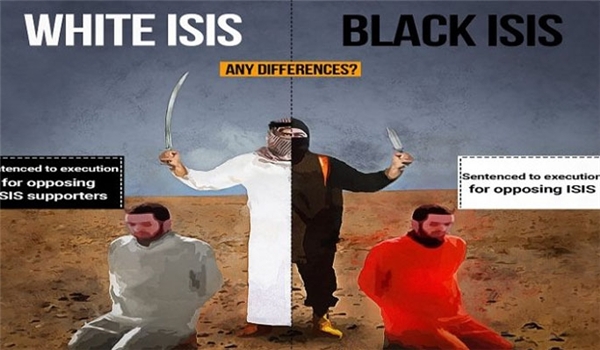
RNA - Zarif told the Oslo Forum in Norway that the Saudis are “actively engaged” in supporting militant factions in Iran's Southeastern Sistan and Baluchestan province, which borders Pakistan. “We have intelligence that Saudi Arabia is actively engaged in promoting terrorist groups operating on the eastern side of Iran in Baluchestan," Zarif said on Tuesday at a news conference on the sidelines of the annual peace mediation in Oslo.
This wouldn’t be unusual:
1) For decades the House of Saud has been desperate to play “Puff the Magic Dragon” with Iran, via its borrowed Israeli tactic of making an aggressive bogeyman out of a country that has attacked no one in hundreds of years. For evidence of a threat, all the Saudis seem to be able to put on the table are “allegations” that Iran is a major backer of terrorism in the region, but fails to provide us any examples.
2) For evidence of Saudi terror backing, it suffices to state that the terrorist groups are using Pakistan’s territory against its will to launch attacks against Iran which only two months ago led to the murder of nine Iranian border guards. On the Western side the same type of activity is being undertaken, again by using the diplomatic hospitality of other neighbors.
3) Last month Saudi deputy crown prince Mohammed bin Salman said that his country would resort to military action “inside Iran”. The June 7 terror attacks came at a sensitive moment in the Persian Gulf, where a new rift opened two weeks ago pitting Qatar, with whom Tehran has ties, against Saudi Arabia, the United Arab Emirates, Egypt and Bahrain.
4) This view is echoed by many pundits in the West. They blame a combination of Saudi Arabia, US, ISIL and the terrorist group of MKO for the twin terror attacks in Tehran. The fact that the two attacks took place after the Riyadh summit that was attended by President Donald Trump, means that both the US and the Saudi regime ordered their proxies to embark on that act.
5) Terror attacks inside Iran are quite rare though, the envy of many Arab neighbors. What the US and its allies label as Iran’s involvement in “foreign terrorism” is Tehran's help to Lebanon’s Hezbollah to protect Lebanon from the Israeli terrorists who have long pummeled that country whenever it chose. And it has been a key member of both the Syrian and Iraqi anti-terrorism coalitions. Iran has done this for what it openly states, that if Wahabbi Saudi-sponsored terrorism is not defeated in these two countries it would become a greater threat to Iran and the region.
6) It does not make sense to sit back and watch the terror slaughter in Syria and Iraq, when the world has solid proof that the Saudis, the US, Israel, and their associates have been major backers of proxy terror groups there, despite the free pass that “fakestream” corporate media has given them on their crimes. Together, they are forming a new type of international terrorism, and they engage in state-sponsored terrorism, directly and indirectly, and evade responsibility via their sovereign immunity.
7) The uncomfortable reality is that the most visible religious figures in Saudi Arabia have made clear that they are not only opposed to religious dialogue, but are openly fomenting divisiveness, most notably by further inciting the sectarian enmity that has gripped the region in recent years. Unlike Iran, which shows open respect for religious differences and leads multi-faith coalitions to roll back the challenge posed by ISIL and other sectarian goons, Saudi Arabia has long been openly pursuing a sectarian agenda for, at least, 70 years. This has been most notable inside Saudi Arabia, Iraq, Syria, and Yemen. Here, Riyadh not only allows sectarian acrimony, but it also condones religious extremism. It supports escalation of sectarianism, and its current management of such sentiment seems only to be producing precisely this result.
Little wonder Foreign Minister Zarif has tweeted: "Terror-sponsoring despots threaten to bring the fight to our homeland. Proxies attack what their masters despise most: the seat of democracy." The inconvenient truth is that since assuming office in January, Trump has also made Iran the focus of his ire, to the point where the Iranians are more than justified in preparing for a US violation of the nuclear deal.
The Trump administration’s consistent and ongoing demonization of Iran flies in the face of reality in which Iran has stood, alongside Syria, Iraq, Russia, the Kurds, and the Lebanese resistance movement Hezbollah, as a pillar against the very same Salafi-Takfiri terrorism that poses a threat to the Western people. It is a struggle in which the Iranians have expended both resources and blood in recent years, and as such justice demands that the world, including the European Union and the United States, acknowledge that they owe Tehran a debt of gratitude.
In sum, the real number one terrorist state in the world today is Saudi Arabia, and Washington has long been well aware of the fact. Even without any evidence of direct links between the Saudis and various Salafi-Takfiri terrorist groups, the extreme Wahhabi interpretation of Sunni Islam embraced by the Saudis as a state religion is nearly indistinguishable from the ideology of ISIL, Al-Qaeda-allied Nusra Front, or any of those terror organizations. The barbarity and mendacity of the Saudis are beyond doubt. When they aren’t terrorizing and butchering their own people at home, they are engaged in despicable war crimes in Iraq, Syria and Yemen – war crimes in which the US and Israel are complicit.
847/940